Marine Corps Aircraft Rescue and Firefighting Specialist, or Marine Corps Firefighters (MOS 7051) for short, provide Aircraft Rescue and Fire Fighting services for airfield operations.
Aircraft Rescue and Firefighting Specialist provide support at Forward Operating Bases (FOB) and support installations.
This Marine MOS is included in Occupational Field 70, Airfield Services, and is open to Master Gunnery Sergeants to Privates.
Table of Contents
Qualifications and Training
To qualify for this MOS, individuals must first take the ASVAB test.
A minimum score of at least 95 is required on the Mechanical Maintenance (MM) portion.
Individuals must be 17-28 years old, be a legal resident, have a high school diploma, a valid state driver’s license, and normal color vision.
Vision correctable to 20/20 with maximum vision impairment of 20/50 is also required.
MOS 7051 has an actual height requirement of at least 59 inches.
Recruits must meet the medical standards found in The National Fire Protection Association (NFPA) 1582 and the Occupational Safety and Health Administration (OSHA) 29 Code of Federal Regulation (CFR) 1910.234.
In addition to medical requirements, physical requirements must also be met, including passing the Physical Fitness Test and Combat Fitness Test.
All recruits will attend Recruit Training at either Marine Corps Recruit Depot Parris Island or Marine Corps Recruit Depot San Diego.
Course work includes completing the Fire Protection Apprentice Marines Course and Fire Protection Apprentice (Air Force) in San Angelo, TX.
Related Article –Marine Corps Infantry Assault (MOS 0351)
What are the job tasks of a Marine Corps Firefighter?
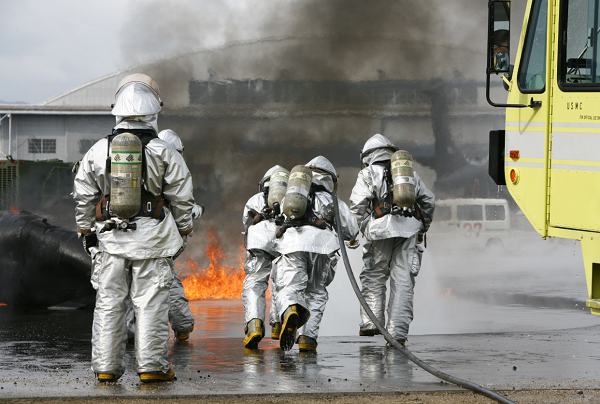
Marine Corps Firefighters are highly trained individuals.
They are trained in fire suppression, rescue and emergency response.
Their duties are similar to that of a civilian firefighter.
Firefighters spend their time training and expanding their knowledge.
Similar to civilian firefighters, they spend days together with other Marines in the firehouse and are required to be ready in a moment’s notice.
One person will remain in an alert position, constantly watching for an emergency call.
They are generally split into crews of 4, with each individual having their own role such as Turret Man, Hand-line man or Rescue Man.
Turret Man is the individual who runs the bumper turret on the truck that sprays high volumes to extinguish fires.
They also keep a watchful eye on the situation for those on the ground.
The Hand-line man will take care of spot fires and are the individuals in the front of the lines, manning the high-pressure hose.
The Rescue Man will go to the fire with the hand-line man to assist with spotting fires and performing rescue functions for anyone on the aircraft or surrounding area.
Firefighters must be familiar with all of their equipment, the equipment on their vehicle and their personal protective equipment.
They wear heat-reflecting, metallic silver proximity gear and confidence in the gear is required for the mission to be successful.
Aircraft Rescue and Firefighting Specialist are often referred to as ARFF (Aircraft Rescue Fire Fighting).
ARFF are required to respond to any emergency situations involving aircraft including fires, malfunctions or crashes.
In certain scenarios, Rescue and Firefighting Specialist are the Incident Command.
During emergency situations, they will perform extrication and rescue missions on Military personnel and civilians alike.
They use a variety of tools such as saws, jaws-of-life hydraulic cutters, and axes to assist with rescue operations.
They provide basic emergency medical services such as CPR, wound suppression, first-aid and tourniquet application.
Firefighters perform salvage and overhaul operations.
In the event of a hazardous material leak, explosion or exposure, Firefighters will be the immediate hazardous material operations level response.
The video below provides more information on Marine Firefighter positions and the bond that is required.
What does a Marine Corps Firefighter get paid?
Marine Corps Firefighters are paid based on rank.
Most individuals with zero experience enter into this position as a Private making roughly $1800 a month in base pay.
Pay will increase as training is completed and individuals are promoted to higher ranks.
Based on recent employee feedback, Indeed currently lists the average salary for this position is just under $30,000 a year in base pay.
The table below can be followed to get an idea of rank and pay in the Marine Corps.
| Insignia | Pay Grade | Rank | Abbreviation | 2023 Minimum Monthly Pay |
|---|---|---|---|---|
| E-1 +4 months | Private | Pvt | $1,917.60 | |
| E-2 | Private First Class | PFC | $2,149.20 | |
| E-3 | Lance Corporal | LCpl | $2,259.90 | |
| E-4 | Corporal | Cpl | $2,503.50 | |
| E-5 | Sergeant | Sgt | $2,730.30 | |
| E-6 | Staff Sergeant | SSgt | $2,980.50 | |
| E-7 | Gunnery Sergeant | GySgt | $3,3445.80 | |
| E-8 | Master Sergeant | MSgt | $4,957.20 | |
| E-8 | First Sergeant | 1stSgt | $4,957.20 | |
| E-9 | Master Gunnery Sergeant | MGySgt | $6,055.50 | |
| E-9 | Sergeant Major | SgtMaj | $6,055.50 | |
| E-9 | Sergeant Major Of The Marine Corps | SgtMaj | $6,055.50 |
Benefits
In addition to the amounts outlined in the table above, the Marine Corps offers many benefits that most civilian positions do not include.
Men and women in the Marine Corps are provided with housing including utility cost and basic maintenance.
Opportunities for advanced education are also available with tuition assistance and GI Bill funding.
The Marine Corps provides insurance, paid sick time, 30 days vacation a year, low-cost life insurance and retirement after 20 years.
Related Article –Marine Corps Mortarman (MOS 0341)
Job Reviews
Most reviews state that the position, and the Marines, are what you make of it.
An average day is spent doing training and having downtime.
Not having a task, but being at work and required to be on call, is not for everyone.
Common themes in reviews discuss learning discipline, skills that transfer to civilian work, having job security and long hours.
Positive aspects include great benefits, creating lasting bonds, and gaining confidence.
Negative reviews discuss being away from home for long periods of time, both during deployment and work rotations, at times having poor leadership, and demanding tasks.
The review below provides details on daily tasks.
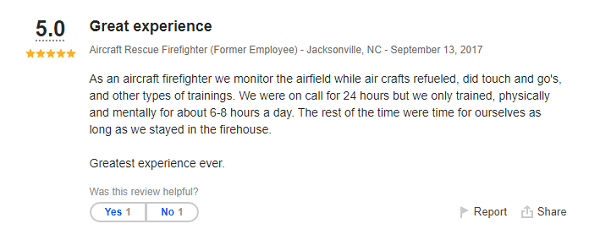
The review below provides detailed information on job duties and experiences as a Marine Firefighter.
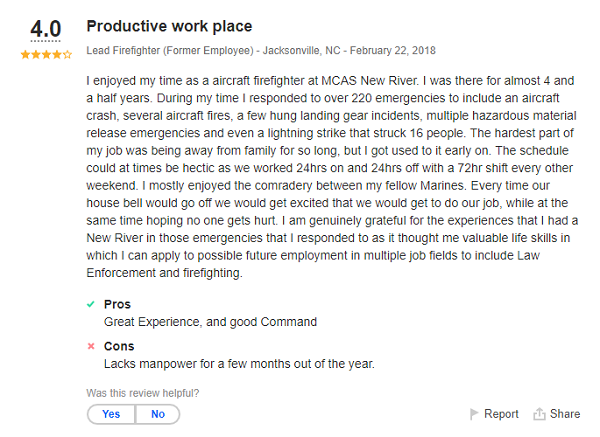
Related Article –Combat Photographer and Videographer (MOS 4641/MOS 4671)
Civilian Career Opportunities
Working in this MOS provides experience with fire response that directly relates to civilian careers.
Marines can find positions with municipal firehouses as firefighters or with agencies as fire investigators.
They can also work at airports or other aviation areas as emergency response and with hazardous materials response teams.
The Marine Corps provides opportunities to Marines while they are serving to advance their skills, opening the door for more civilian job opportunities and higher pay.
A few of those opportunities include apprenticeship programs through USMAP and credential programming through USMC COOL program.
Frequently Asked Questions
What ASVAB score do I need to be a Marine Corps firefighter?
To qualify as a Marine Corps Aircraft Rescue and Firefighting Specialist, you need a minimum score of 95 on the Mechanical Maintenance portion of the Armed Forces Vocational Aptitude Battery.
How much does a firefighter in the Marines make?
All U.S. military personnel are paid according to rank and time in service, and newly enlisted Marines can expect a base pay of about $1,800 a month before allowances and incentive pay.
Where is training for Accident Fire Rescue USMC?
Training for firefighters in the Marines takes place at Goodfellow AFB, near San Angelo, Texas, and includes basics like learning to operate firefighting vehicles or rescue vehicles, as well as basic techniques and procedures.
How long is training for a Marine Corps Aircraft Rescue and Firefighting Specialist?
After boot camp, Marine firefighters attend the USAF fire protection apprentice course at Goodfellow, AFB, Texas, and training duration lasts 68 days.
Summary
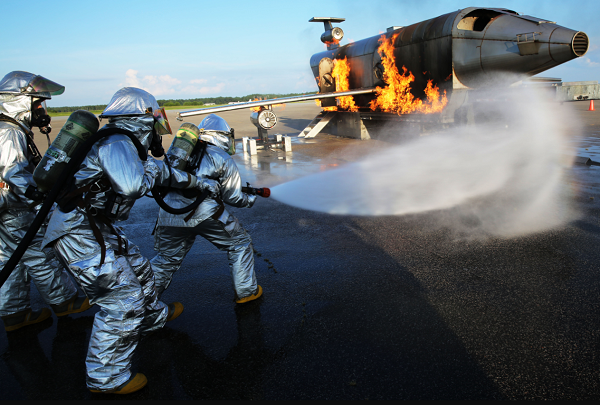
Marine Corps Aircraft Rescue and Firefighting Specialist, or Marine Corps Firefighters (MOS 7051) provide support and emergency response for airfield operations.
They are highly trained and are constantly working to improve response times/skills.
Entering into this MOS requires meeting medical, physical, height, weight and body fat requirements in addition to completing stringent training.
Once in this position, Firefighters are paid based on rank.
Available reviews for this position rate the position highly.
Skills learned translate to civilian firefighting and emergency response careers.
Related Article- Aircraft Maintenance Administration Specialist (MOS 6046)
References
Military Occupational Specialty Manual
- 5 Best Jobs for Female Marines - June 20, 2024
- 10 Best Marine Corps Recruiting Videos of All Time - June 20, 2024
- Marine Corps Requirements - June 20, 2024
Originally posted on November 23, 2019 @ 12:17 am
Affiliate Disclosure: This post may contain affiliate links. If you click and purchase, I may receive a small commission at no extra cost to you. I only recommend products I have personally vetted. Learn more.
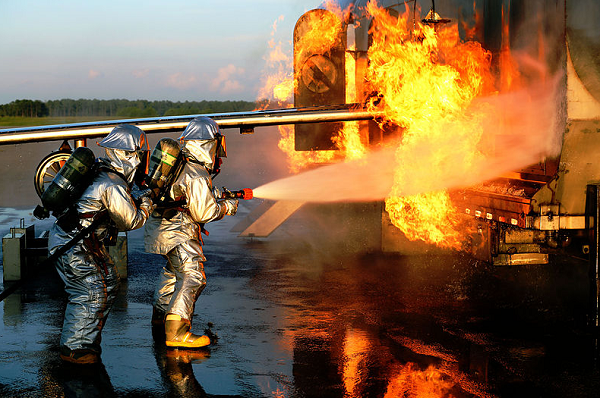

I was an aviation crash crewman during the 70s and loved it. I got out and did a 30-year career as a police officer and this MOS helped tremendously during my hiring process because of the dedication and teamwork firefighting instills into your character. Back in our day we trained at NAS Memphis in Millington Tennessee so I can’t comment on what an Air Force school would be like but I can tell you this was one kick-in-the-butt exciting job and I would do it all over again if I could.